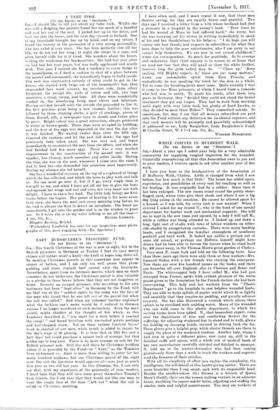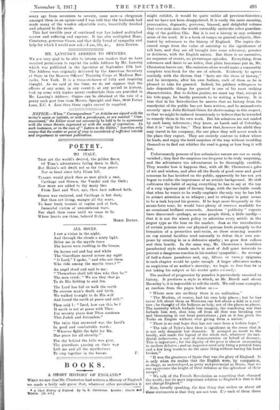WRITE COIFFES IN. MULBERRY WALK.
[To THE Earros or sus Seecrasea.")
Sra,—About a year ago I asked your help for a very admirable community for supplying surgical requisites for the wounded. Gratefully remembering all that this Association owes to you and to your readers, I venture again to ask after another year of fine work.
I have just been to the headquarters of the Association at 17 Mulberry Walk, Chelsea. Little is changed from what I saw before, but how much is that little! The house has added space, experience, and possibilities of every sort for teaching as well as for healing. It was originally lent by a soldier. Since then it has been enlarged. The new rooms stand round the pretty stone- flagged yard. where trees give their shade and where I saw a big dog lying asleep in the sunshine. Be cannot be allowed space for a kennel, so I was told, for every inch is now wanted! When I arrived I asked for my friend N., who is the head of one special department for leather work and mechanical supports. She told one to wait in the new room just opened, by a lady I will call M., while a soldier was being attended to. I looked up and down a long, light sort of studio with rows of lattice windows on either side shaded by orange-tawny curtains. There were many bending heads. and I recognized the familiar atmosphere of assiduous goodwill and hard work. It looked not unlike a picture out of some old missal, or perhaps one Holbein himself might have drawn had he been able to foresee the future when he stood hard by, 400 years away, in Sir Thomas More's great garden at Chelsea. Very soon N. came back and told me the following facts. Less than three years ago there were only three or four workers—Mrs. Leonard Stokes with a few friends was starting the enterprise. Now there are over five hundred names on the books, and there are branches all over England, also in Florence and Rome and Paris. The white-capped lady I have mallet M., who had just returned from France, spoke with evident ph asure of the warm praise given to the Association by the French doctors she had been interviewing. This Indy and her workers from the "Plastic Department" go to the hospitals to cast helpless wounded limbs. They are able to make splints of papier 'niche which fit so lightly and smoothly that they require 710 padding, and greatly advance recovery. She has also discovered a varnish which allow. these splints to be sterilized with scalding water. Many of the wounded who can walk come to this plastic deportment, to which two casting rooms have been added. N., that benevolent expert, rules over the department of wise and comforting devices for the suffering; for adjusting weakened feet to stand and to walk, gloves for holding up drooping hands, injured in driving back the foe. These gloves give a helpful grip, while elastic threads are there to supply the place of the weakened tendons. Another lady, whom I had seen in quite a different guise, now came up, still in the familiar coiffe and apron, with a whole row of medical boots of her own manufacture carefully stitched and finished to measure. N. told me of the master-shoemaker who had been coming gratuitously three days a week to teach the workers and superin- tend the firmness of their stitches.
With all its simplicity of effort you realize the complexity, the intelligence, the self-denial of this health-giving centre. There are more branches than I can count, each with its responsible head. Besides the needleworkers (the Society is a branch of Queen Mary's Guild), there are the women making varnish in an adjacent house, moulding the papier mdch4 baths, adjusting and stuffing the wooden rests and helpful contrivances. You may see workers of
every age from seventeen to seventy, some men—a clergyman amongst them in an apron—and I was told that the husbands had made many of the wooden adjustable rests, beautifully finished and adapted to the needs.
This last terrible year of continued war has indeed multiplied sorrow and suffering and expense. It has also multiplied Hope, Constancy, generous Grace, and that daily bread of sympathy and help for which I would now ask. —I am, Sir, Sc., Anne RITCHIE.















































 Previous page
Previous page